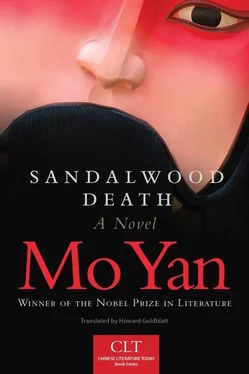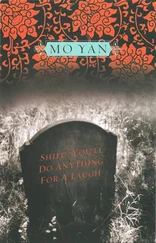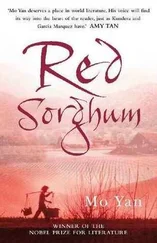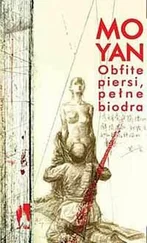My dieh had seen that there were two criminals even before I had, but he’d witnessed so much in his life that one more criminal, or ten for that matter, had no effect on him. I overheard him say under his breath:
“I’m glad I prepared an extra stake.”
My dieh was a man of foresight, a modern-day Zhuge Liang.
Who would be first? First impale the real criminal or the imposter? I tried to find the answer in my dieh’s face. But his gaze was glued to the face of the official in charge of the execution, Qian Ding, who was returning the look, though his gaze was clouded, sort of like a blind man. The look in Qian Ding’s eyes told my dieh that he was seeing nothing. It was up to my dieh to choose the first to be impaled. So he turned his eyes to the two criminals in front of him. The eyes of the fake Sun Bing were unfocused. Those of the real Sun Bing emitted a strong, steady gaze. He nodded to my dieh and said loudly:
“You are well, I assume, Qinjia!”
My dieh responded with a smile and a respectful bow with his fists closed over his chest.
“A joyous day for you, Qinjia!” he replied.
“For both of us,” my gongdieh said jubilantly.
“Who first, you or him?”
“Do you really need to ask?” my gongdieh replied forthrightly. “As they say, ‘Relatives tend to favor each other.’”
Dieh said nothing in response; he merely smiled and nodded. But then, as if a sheet of paper had been removed, his smile gave way to a face the color of pig iron. He turned to the prisoner’s escorts.
“Unlock the shackles!” he ordered.
Unsure of what to do, they looked around, as if waiting for a command from someone. My dieh repeated himself, impatiently:
“Unlock the shackles!”
One of them stepped up and, with trembling hands, unlocked my gongdieh’s chains. Now freed, he moved his arms around to limber them up, eyed the instruments of execution, and, as if this was the moment he’d waited for, strode confidently up to the pine plank, which was considerably narrower than his body, and lay down on his belly.
The plank, which Dieh had commissioned from the county’s finest carpenter, was as slick as glass. It had been placed across a hog-butchering rack that I’d used for more than a decade. By now the wood, saturated with pig’s blood, was as heavy as a bar of iron. It had required four strapping yayi to carry it over from our yard, forced to take ten or more breaks along the way. From where he lay on the wooden plank, my gongdieh turned his head toward us and asked modestly:
“Like this, Qinjia?”
Ignoring the question, my dieh reached under the stand to retrieve the leather strap we’d readied. He handed it to me.
About time, I was thinking. I snatched the strap out of Dieh’s hand and began to tie up my gongdieh just the way I’d practiced it. My gongdieh was not pleased.
“You must not think much of me, worthy son-in-law,” he said.
My dieh, who was watching my every move from right beside me, reached down to retie a knot I’d bungled. My gongdieh huffed and puffed to show his displeasure at being tied down. He was overdoing it, I thought; so did my dieh, who had to remind the man sternly:
“Don’t be so stubborn, Qinjia. I’m not sure you will be in control of your body when this trial of strength and will commences.”
But my gongdieh’s complaints kept coming, even after I’d strapped him down tightly on the wooden plank. Dieh tried to slip his finger between the strap and the man—he couldn’t. That was how he wanted it, and he nodded to show he was satisfied.
“Begin,” he said softly.
I went over to the knife hamper and removed the knife I’d used on the rooster a short while ago. With it I sliced open my gongdieh’s pants to expose his buttocks. After laying the oil-saturated mallet next to my hand, Dieh selected the sandalwood stake that seemed the smoothest, and wiped it down with an oilcloth. Taking a position to the left of my gongdieh, he held the stake in both hands and placed the pointed end, which was as round as a calamus leaf, at a spot just below my gongdieh’s tailbone, as he continued to complain, loudly and obstinately, interspersed with snippets of Maoqiang opera, as if what was about to happen was of no concern to him. But I could tell from the slight tremors in his voice and the twitching of his calf muscles that deep down he was tense and fearful. My dieh, who by then had stopped conversing with my gongdieh, held the stake tightly; I saw a serene expression on his red face as he raised his head and gave me an encouraging, expectant look. His affection toward me was plain to see, meow meow , and I knew there wasn’t a better dieh anywhere in the world. How lucky I was to have such a wonderful dieh, meow meow , and that was all made possible by my mother’s lifelong devotion to the Buddhist way. Dieh signaled with his chin for me to begin. So I spat in my hands, leaned to one side and took a step backward, and dug in my heels until I was anchored like a stake in the ground.
I picked up the mallet and gave the butt end of the sandalwood stake a light tap to see how it felt. Meow meow , not bad, no trouble at all. Now the real pounding began, neither fast nor slow, and I watched as my pounding drove the stake into my gongdieh’s body, inch by inch. The sound it made wasn’t heavy—— beng —— beng —— beng —— meow meow ——not even loud enough to cover the sound of my gongdieh’s heavy breathing.
As the stake penetrated more deeply, my gongdieh’s body began to shake; despite the fact that he was strapped down so tightly he couldn’t move, every muscle in his body convulsed, causing even the heavy plank under him to move violently. But I kept pounding—— beng——beng——beng ——keeping in mind my dieh’s instructions: “Son, you must use only half the strength in your arm.”
I saw my gongdieh’s head shake uncontrollably. He seemed to be stretching his neck out of shape. If I hadn’t seen it with my own eyes, I’d never have believed that a man could do that to his neck. Fiercely stretching it out——stretch——stretch——stretch——as far as it would go, until, like a leather strap about to snap in two, his head looked like it was on the verge of separating itself from his body. Then his neck snapped back with incredible force, until it completely disappeared, as if his head were growing straight out of his shoulders.
beng——beng——beng——
Meow meow——
My gongdieh’s body was heating up; his clothes were drenched with sweat. Whenever he raised his head, I saw rivulets of sweat coursing down from his damp hair, sweat that was a sticky yellow, like rice soup straight from the pot; and when he turned his head toward me, I saw how puffy his face had gotten, looking like a bronze-colored basin. His sunken eyes reminded me of those butchered pigs I puffed up before skinning them, meow meow , just like the hollow eyes of a puffed-up pig.
pa——pa——pa——
Meow …
The sandalwood stake was nearly halfway in—— meow … sweet-smelling sandalwood… meow … Up to this point, my gongdieh had not uttered a sound. The look on Dieh’s face showed his admiration toward the man. Long before we began, Dieh and I had striven to anticipate every situation that might arise during the execution. Dieh’s greatest fear was that my gongdieh would fill the air with wild shrieks and howls that would unnerve me, a neophyte, at my first execution, and that I’d start doing things wrong, like driving the stake too hard and damaging the internal organs. To keep that from happening, he’d wrapped a pair of date pits in cotton, ready to stuff into my ears if his fears were borne out. But my gongdieh still hadn’t made a sound, except for heavy breathing that was louder and huskier than any I’d ever heard from a buffalo pulling a plow. He did not bellow in pain, nor did he weep or beg for mercy.
Читать дальше












